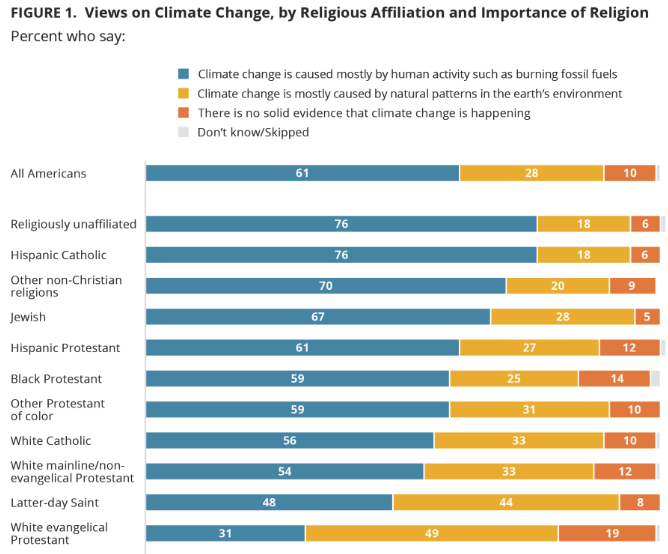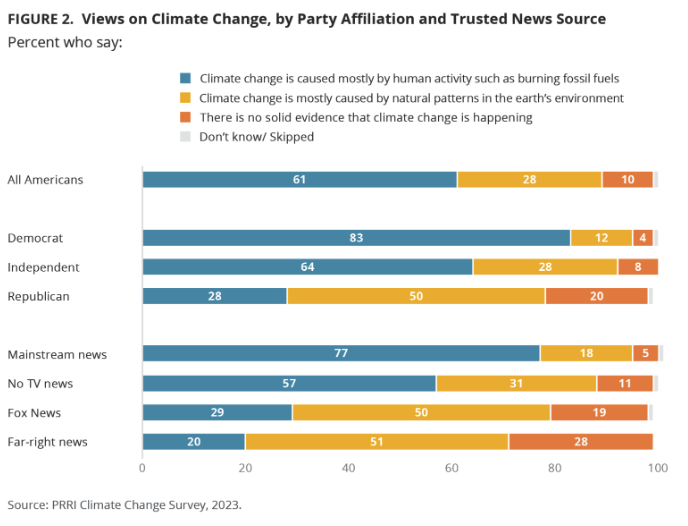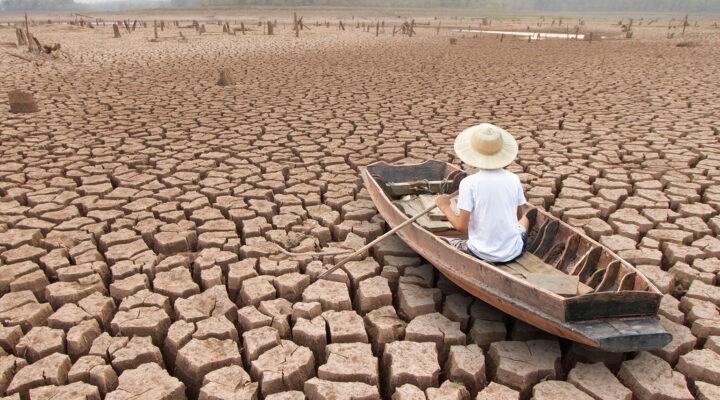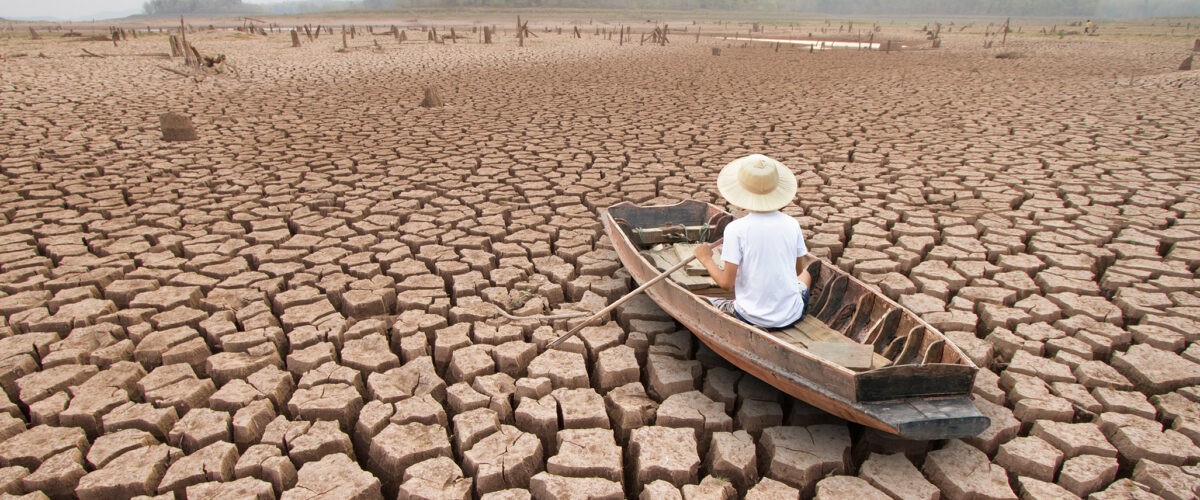Religious perspectives play a major role in determining how Americans view climate change, according to a survey conducted by PRRI, the Public Religion Research Institute.
Among all Americans, 61% indicated they believe “climate change is caused mostly by human activity, such as burning fossil fuels.” Another 28% said they think “climate change is mostly caused by natural patterns in the earth’s environment.” And the smallest group, 10%, claimed “there is no solid evidence that climate change is happening.”
Three groups of racial or ethnic minority Protestants most closely mirror the national pattern.
Among Hispanic Protestants, 61% blame human activity for climate change, while 27% say it’s caused by natural patterns and 12% deny climate change. Black Protestants’ numbers are 59% citing human activity, 25% pointing to natural patterns and 14% denying change. Other Protestants of color follow a similar arc — 59% human activity, 31% natural patterns and 10% no change.
At the poles of the survey, Americans who claim no religious affiliation and Hispanic Catholics are most inclined to acknowledge climate change and chalk it up to human behavior, while white evangelical Protestants populate the opposite perspective.
Numbers for the religiously unaffiliated and Hispanic Catholics are identical — 76% blame human activity, 18% cite natural patterns and 6% see “no solid evidence” of change.
Meanwhile, only 31% of white evangelical Protestants think people cause climate change, while 49% point to natural patterns as the cause, and almost one in five, 19%, deny any change.
Jews (67%) and adherents of other non-Christian religions (70%) solidly credit humans with causing climate change. Slight majorities of White Catholics (56%) and white mainline/nonevangelical Protestants (54%) believe human action is the culprit. Latter-day Saints are about evenly split, with 48% pointing to human action and 44% crediting natural causes.
PRRI also separated religion-based climate-change views from denominational affiliation. The survey asked participants to answer the climate questions in light of the importance of religion in their lives.
Respondents who said religion is “the most important thing” were least likely to think people cause climate change and most likely to deny change altogether.
Respondents who said religion is “the most important thing” were least likely to think people cause climate change and most likely to deny change altogether. Of these highly religious, 39% agree humans cause climate change, 40% cite natural patterns and 20% deny change.
Among those who said religion is “one among many important things,” 56% blame humans, 33% point to natural patterns and 10% deny change.
For those who think religion is “not as important as other things,” 65% blame humans, 26% look to natural patterns and 8% deny change.

Finally, among respondents who said religion is “not important,” 78% think humans are the primary cause, 16% look to nature and only 5% deny change.
Asked if they believe climate change is a crisis, religiously unaffiliated respondents (43%) were most likely to say yes, while white evangelical Protestants (8%) were least likely to agree.
Among other faith groups, the portions who said climate change presents a crisis were Jews (32%), Hispanic Catholics (31%), other Protestants of color (27%), white mainline/nonevangelical Protestants (22%), white Catholics (20%), Black Protestants (19%), Hispanic Protestants (16%) and Latter-day Saints (10%).
PRRI examined climate-change perspectives in light of political affiliation.
Democrats (83%) are far more likely than Republicans (28%) to cite human causes for climate change, with Independents (64%) falling in the middle.
On the other end of the spectrum, Republicans (20%) are five times as likely as Democrats (4%) to deny climate change, with Independents (8%) leaning toward Democrats.
PRRI additionally looked at the influence of age on belief about climate change. Except for the oldest Americans, a majority in each generational cohort said they believe humans are the primary cause of climate change.

In that oldest group, the Silent Generation, 47% blamed humans for the change. A majority in each of the others — Millennials (68%), Generation Z (67%), Generation X (58%) and Baby Boomers (55%) — said human action has caused climate change.
The numbers for climate-change deniers in each group were Silent Generation (13%), Gen X (12%), Gen Z (10%), Millennials (9%) and Baby Boomers (8%).
Testing Americans’ apocalyptic perspective, PRRI’s survey found that about one in three respondents (35%) “agree that the severity of recent natural disasters is evidence that we are in what the Bible calls ‘the end of times.’” Conversely, 63% do not hold that view. Asked the same question in 2014, Americans were evenly split, with 49% agreeing and 47% disagreeing.
As with opinions about the reality and causes of climate change, religion shaped whether people think climate catastrophes signal end times.
Black Protestants were most likely to connect climate change to end times, with 73% agreeing with that assessment. Agreement numbers for other religious groups included white evangelical Protestant (62%), Hispanic Catholic (49%), white mainline/nonevangelical Protestant (23%), white Catholic (21%) and religiously unaffiliated (13%).
Respondents who said religion is “the most important thing” also were most likely (67%) to connect climate to end times.
Parsed according to the importance of religion in respondents’ lives, end-times expectations paralleled connections between faith and climate-change denial.
Respondents who said religion is “the most important thing” also were most likely (67%) to connect climate to end times. That expectation tapered off for those who said religion is “one among many important things” (46%), and fell further for respondents who said religion is “not as important as other things” (20%) and “not important” (12%).
The comparison for political affiliation and end times expectation showed minorities for all groups, with Republicans (44%) making the highest connection, followed by Democrats (30%) and Independents (29).
Looking at “God’s will” and climate change destruction, the survey learned minorities of all Americans, as well as minorities in each faith group, say “God would not allow humans to destroy the earth.”
Of all Americans, 28% believe God would prevent humans from destroying the earth. Proportions of specific faith groups who hold that view are Black Protestant (46%), Hispanic Catholic (44%), Later-day Saint (43%), Hispanic Protestant (43%) and other nonwhite Protestant (37%).
Also, white evangelical Protestant (35%), white Catholic (24%), Jewish (24%), white mainline/nonevangelical Protestant (22%), other non-Christian religious (22%) and religiously unaffiliated (13%).
Related articles:
Christians and climate change: A chance to take the Bible seriously
The fantastical world of climate change denial: Slouching toward annihilation
Must we change our language to reach climate change deniers?
National Association of Evangelicals joins call for attention to climate change


